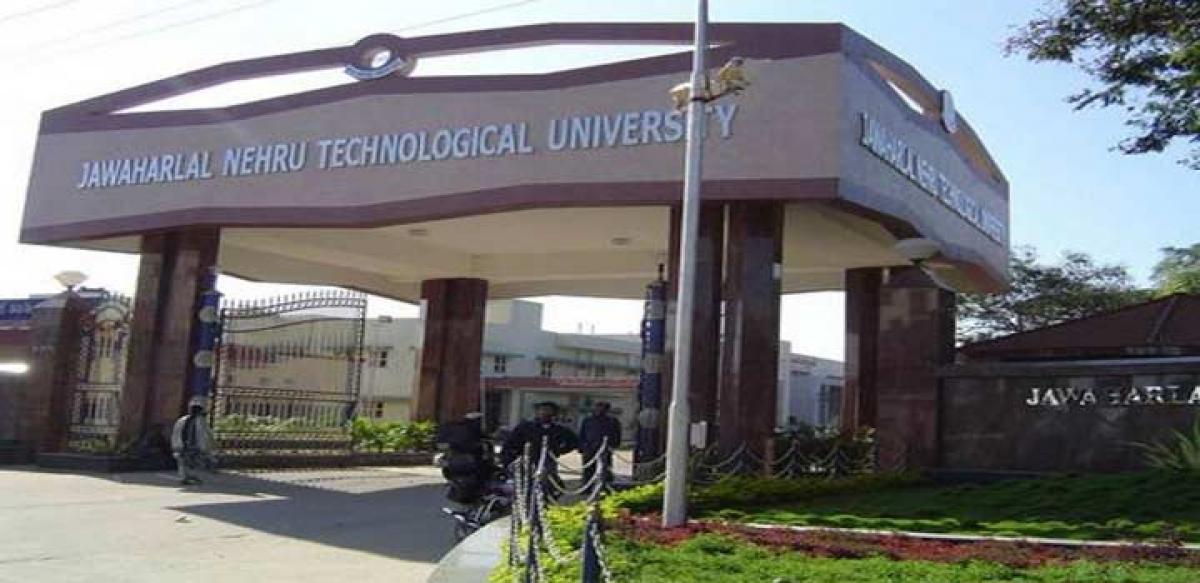Live
- U20 men's football nationals: Telangana see off Sikkim to set up QF clash against Manipur
- Chintamaneni Prabhakar Promises Security and Welfare for Poor Families with Babu's Super 6 Schemes
- J&K Police file case against attempt to disrespect place of worship
- Velampalli Srinivasa Rao Seeks Votes in 61st Division, Slams Opposition Parties
- Major Development Projects Completed in Bhimavaram Town by MLA Grandhi Srinivas
- Vice Prez offers prayers in Tirumala temple
- Tech Mahindra shares jump more than 8 per cent on turnaround strategy
- Long queues outside polling booths in Jammu-Reasi LS constituency
- Indian startups file 83,000 patents in FY23; AI, neurotechnology lead
- 31.77 pc polling in Maharashtra's 8 seats till 1 p.m.
Just In

x
Highlights
Academic Senates Formed At Varsities. After months of delay, state government has started constituting Academic Senates at various universities in the state, paving the way for the much needed re-orientation of academic activity.
l But no word about ECs
l CM- Deputy CM feud stalls the process

After months of delay, state government has started constituting Academic Senates at various universities in the state, paving the way for the much needed re-orientation of academic activity. Five universities- Andhra (Visakhapatnam), Sri Venkateswara (Tirupathi), Krishna (Machilipatnam), Mahatma Gandhi (Nalgonda) and Satavahana (Karimnagar) have got new Senates.
Some more universities will also have the senate committees constituted shortly according to well-placed sources in the AP State Council of Higher Education, which is the nodal authority for the exercise. The Council gets the proposals from each university and sends them to the Ministry of Higher Education, which ratifies them without any query.
Academic Senate of university consists of one third of total number of professors, principals of the affiliated and constituent colleges, research scholars, and some other experts in the field on that area. While the bigger universities like Andhra have a senate of 45+ members, smaller ones have just around 30.
Since there is no controversy with the people in Academic Senates, government has been giving its stamp approval for their formation without much delay. But the government owes explanation on why the formation of Executive Councils (ECs) has been put in backburner for over three years from now.
ECs are key to the functioning of universities. Most of the issues with regard to infrastructural development, introduction of new courses, revision of syllabi, new projects, usage of funds, student welfare, employee welfare, and generation of internal resources will be handled by the ECs only and the Vice-Chancellor of every varsity is guided by the decisions of EC.
Out of 24 universities, 22 have no ECs since 2010. Only Osmania and JNTU-Hyderabad have ECs which have been meeting at regular intervals and taking all the decisions.
Governor ESL Narasimhan, who is the chancellor of the state universities- had in 2010, cancelled the ECs of 10 varsities with one stroke and directed the Government to form a collegiums to select candidates for ECs.
A Collegium was formed and it made recommendations in 2011 but the government did not clear at its level itself due to differences between the Chief Minister N Kiran Kumar Reddy and the Deputy Chief Minister Damodara Rajanarasimha, who is also Minister for Higher Education.
It has become a practice for the successive governments to appoint at least 6 to 8 of their yes-men as members of ECs in the name of ‘prominent people of that area’. Since most of them are political activists, both Chief Minister and his deputy have tried hard to place their men, resulting in stalling of entire process. The proposals have gathered dust over the past two-half years and in spite of repeated queries from the Governor, government continued to dodge the issue.
The delay in constituting ECs came in handy for some Vice Chancellors as the entire power vested in them and they started taking decisions at their wish and will. There was no body to question them, although some employees unions or student organizations have been raising their voice, it was of no avail.
This resulted in allegations of unbridled corruption. Several cases of corruption and nepotism at AU, Adikavi Nannayya, Kakatiya, Telangana, Kadapa have come to light and they are now under the APSCHE scanner.

Next Story
More Stories
ADVERTISEMENT
© 2024 Hyderabad Media House Limited/The Hans India. All rights reserved. Powered by hocalwire.com







